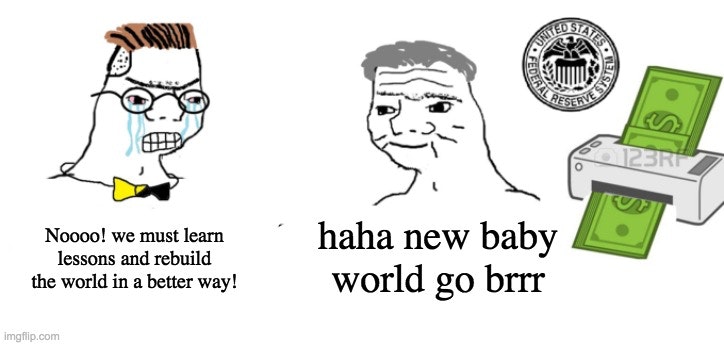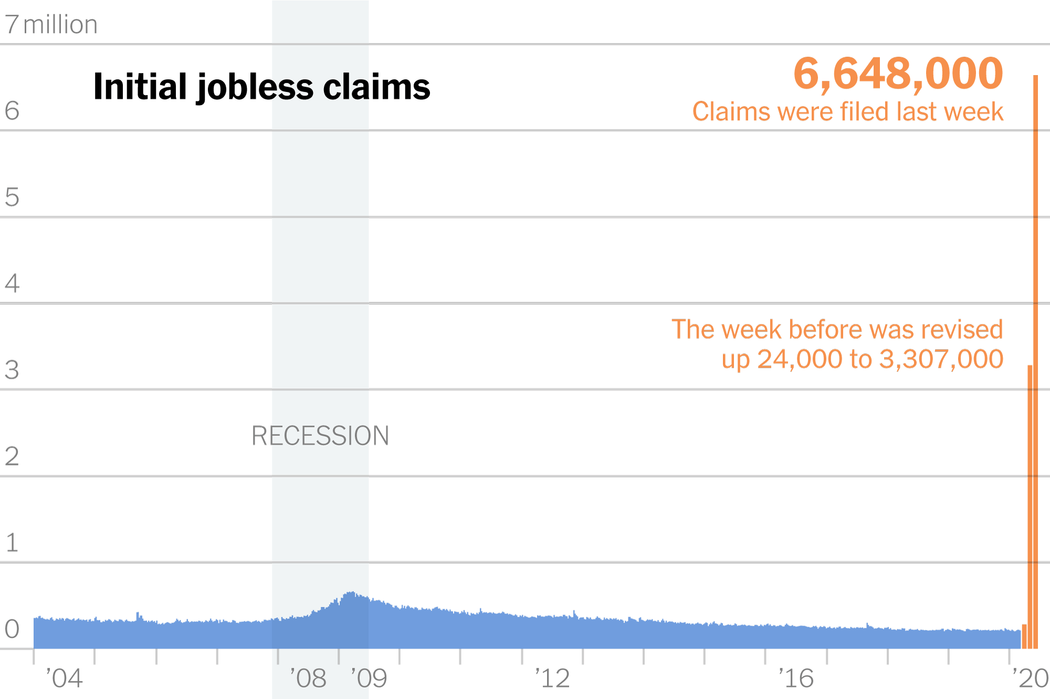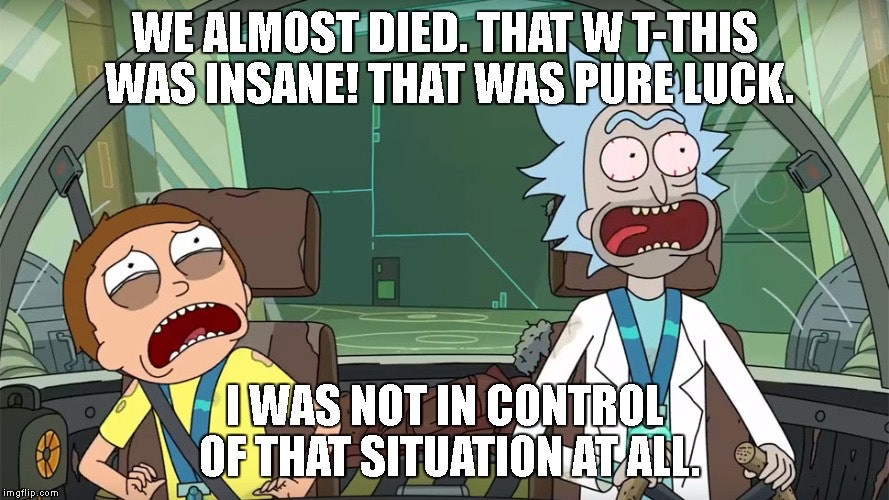I hope all of you are taking the appropriate measures to weather this crisis we’re in. If you haven’t, my March 12 post, Gigging in the Time of Corona might help you triage your personal situation. This week, I want to take a somewhat broader view of the unfolding drama, and our place in it as members (or potential future members) of the gig economy.
Here’s the headline behind the headlines that few people are shouting out loud as yet: there has been a murder on the history express. The old Industrial Age world just died, murdered so suddenly by Covid-19 that most people don’t even realize it is dead.
The murder happened while the world was already in a weakened state — economically, politically, culturally, spiritually, ideologically, demographically, climatologically. A new world — the young software-eaten one that is frankly not ready for the responsibility — is taking its place with such rapidity, most of us are not aware that a succession event, not just a temporary substitution event, is taking place.
The world is dead, long live the world.
Why does it matter to us in the gig economy? Because for better or worse, the gig economy is firmly a part of the new world being pushed center-stage, and is suddenly being called upon to play a much bigger role in the crisis than it is used to. Instacart, for instance, is suddenly trying to hire 300,000 new gig workers. Some towns are shutting down public transit and are in talks with rideshare companies to backstop transportation. And much to my pleasant surprise, politicians have been trying to include self-employed people, gig workers and contractors in unemployment relief schemes. That’s just the tip of the iceberg of what’s going on.
While there are elements of the succession that are both orderly and long-predicted — for example, the rise of remote work, and the growing dominance of a delivery economy over a retail economy — this is not a controlled and orderly succession event. The situation is nowhere near being under control, much as governance institutions try to reassure us that it is. The industrial world was not ready to die such a sudden death, and people invested in it are still fervently hoping it will come back.
There may be a bit of a dead-cat bounce (dead-world bounce?) as immediate relief measures take effect in a few months, but don’t be fooled. Long-term, the old world is dead. This blow has been too severe. Don’t mistake the corpse jerking around due to resuscitation measures for a live entity.
On the flip side, the digital world was not expecting to step into the industrial world’s shoes so suddenly (one of the darkly funny things going on is the whiplash being experienced by tech critics — the so-called “techlash” is suddenly dead, now that app-based shopping and virtual work tools are kinda saving the world in the B-plot while healthcare workers are fighting the virus itself in the A-plot).
This unplanned succession story is part of the broader go brr story, as my meme above suggests.
To take just the piece of this chaotic succession of relevance to us here in the gig economy, consider what’s happened to the labor market.
In the last week, 6.6 million Americans filed for unemployment, almost 10x the previous record in 1982, and bringing the current total to around 10 million. The picture in other countries is going to be similar. To put it in perspective, that’s about 6% of the workforce, or comparable to the number of jobs the economy normally sheds/adds in any given normal month, but as with the comparison of Covid-19 to the flu, the direct comparison is meaningless. This is not like the normal evenly distributed transitional unemployment that the system is designed for. This is a very unbalanced surge, much like the surge hospitals are experiencing.
This graph of unemployment claims from the New York Times looks like a vertical straight line. I bet ER admissions curves are looking similar in hotspots. And unfortunately, we don’t know how to flatten this curve. There is no obvious mechanism like “social distancing” to smooth this thing out.
These are not just big, record-setting numbers. They’re fundamentally numbers that are beyond the reach of all available governance mechanisms.
To use a control theory concept, the severity of this disturbance has caused all available actuators — fiscal deficits, interest rates, stimulus checks, unemployment relief strengthening measures — to saturate. They’ve topped out far below the levels required to correct the situation.
Unemployment claims are something like Covid-19 tests: they cover only a fraction of the infected, and disproportionately reflect those ill enough to go to a hospital, and procedurally enabled to do so. In other words, 10 million is a very conservative ceiling. I would estimate that perhaps 10x as many are actually “infected” by the economic contagion and will end up experiencing some form of mild to severe economic distress before we’re done. That’s 100 million, or 2/3 of the American work force. The relatively safe 1/3 that might survive unscathed and perhaps even thrive? The tech economy. New baby world go brrr.
Some calibration. During the 2008 recession, workforce participation rate in the US fell from a high of about 67% to 63% and stayed there even though GDP recovered (the so-called jobless recovery — nominal employment bounced back, but participation rate did not). The difference was people who either gave up looking, or ended up in the gig economy in undocumented ways. That was a relatively modest structural shift. The shift that will follow this time will be much more radical, but it is unclear what form it will take.
Don’t extrapolate initial responses too naively. For example, sure Instacart is trying to hire 300,000 new gig workers even as the regular paycheck retail sector melts down. But that sort of initial natural market response may not be a valid indicator of the shape of the eventual outcome. We may see the creation of some sort of vast public works/employment program for instance, and a wave of nationalization of critical infrastructure sectors. In the US, the healthcare sector and health insurance models will almost certainly be transformed in response, for better or worse.
But to repeat my main point, the situation is not under control. The available mechanisms simply do not have enough control authority for anybody to be in control. Not central bankers, not political leaders (authoritarian or non-authoritarian), not people sewing cloth masks and baking bread at home to do their part, not libertarian preppers realizing that they stockpiled the wrong things.
The collective governance problem here is a bit like trying to steer the Titanic with a kayak paddle, after it has hit the iceberg.
The industrial world was simply not designed to be governable through such a crisis. When you look at previous crises the industrial world got through alive (relatively speaking) — World Wars 1 and 2, the Spanish Flu, the 70s oil shocks, the collapse of the Soviet Union — you always find a period where essentially nobody was in charge for a while. Luck, momentum, and emergence effects shaped the outcome and averted the apocalypse, not the designs of people who thought they were in control.
The digital world on the other hand, is capable of governing through such a crisis I suspect, but is simply not mature enough in the relevant capabilities yet.
The next 18 months will see a rapid and serious increase in the systemic capabilities of the digital world, but it won’t be enough, or quick enough, to regain control of this situation. The digital capabilities we are acquiring in war-mode right now will make the response to the next pandemic (and there will be a next pandemic) better governed, but this one is going to be a hugely chaotic succession/transformation event.
Next time we’ll have fancy blockchain based pandemic surveillance tech on our phones.
Next time we’ll have better unemployment and health insurance models.
Next time we’ll do this social distancing thing without throwing a third of the work force into unemployment.
But this time… not so much.
As every political leader is saying, we’ll get through this. But not because anybody has a plan or is meaningfully in charge.
We’ll get through this because the evidence of history suggests that the new world will emerge rapidly to take the place of the dead old world in an unplanned emergent way. In a nature-abhors-a-vacuum way. In a way that doesn’t satisfy the Brave New World design urges of any of the ideologues currently salivating over utopian reconstruction possibilities.
I am belaboring this point because I am bemused by the analysis posture adopted by so many otherwise smart people: that while this is a bad situation, it is in some sense a situation that is under control.
A reassuring picture is being painted that between global public health agencies, central banks, political leadership (however inept) and corporate agility, there is enough governance authority to actually meaningfully steer the situation. We are talking of vast deficits, radical shutdown measures, grounded airline fleets, and an emergency mode reshaping of the economy from brick-and-mortar to virtual as though they collectively constitute a thoughtfully planned response that’s proportionate to the situation.
It is not.
Nobody is in charge. Not Trump, not Wall Street, not central banks, not Dr. Fauci, not the WHO, not Xi Jinpeng, not 3M churning out N95 masks, not Amazon, not Instacart, not motorcycle gangs LARPing Mad Max futures. Not your favorite Cassandra exulting in a dark sense of their own prophetic told-you-so rightness.
Agency does not equal controllability. All these actors are doing things that will shape the emergence of the new world, but the bulk of the emergence will be ungoverned. It will involve all sorts of weird random things that get locked in as new defaults. Strange initial conditions nobody chose will turn out to be crucial in setting new directions and creating an anatomy for the new world.
So pay attention. The outcomes will not match the blueprints.
For us in the gig economy, this is the most important thing to remember as we plan our individual next moves through the turbulence. Perhaps you’ll get really lucky and your corner of the world will sail through the crisis peacefully, and perhaps come out on top. Perhaps you’ll get really unlucky and your entire life will get destroyed by this. Most of us will land somewhere in between those two extremes.
But what none of us will have is the luxury of a clearly defined role within a larger plan coordinating the response, with clear instructions on what to do next.
This is a condition we in the gig economy are used to. We are used to there being no plan. We are used to navigating open waters and ungoverned conditions. We are used to the economic wilderness in a way most of the world is not.
But that doesn’t mean we’re in a sustainably better place than the paycheck world. It just means we’ve bought ourselves a little extra time compared to most.
In a fast-developing crisis, a little extra time is worth a lot, and easy to waste, as world leaders have shown us. Use it well, or lose it.
I’ll keep tracking this situation as it evolves, and I’ll be doing my best to provide some hopefully useful running commentary on the gig economy subplot. But the bulk of what happens to you depends on you.
Art of Gig Community V 0.1
Over the last 2 weeks, we’ve gotten two community things going. It’s a bit rudimentary and hastily slapped together so it can be of some use in this situation, but hopefully we can make it better in the coming weeks.
-
A publicly editable Roam database. Start with this Welcome page.
-
An Art of Gig discord server. Here is an invite link.
I’ve also been doing a prompt of the week. Here is this week’s prompt.
-
If you’re willing to volunteer to host a weekly 30 minute voice chat session on the Discord server, add your name, day, time, and time-zone to the Discord Chat Schedule page on the Roam database. I’m planning on hosting one on Friday mornings, 9:00-9:30 AM Pacific time.
I hope to grow this community infrastructure into a useful resource, especially during this tough period we’re entering. But you’ll need to pitch in for that to happen.


